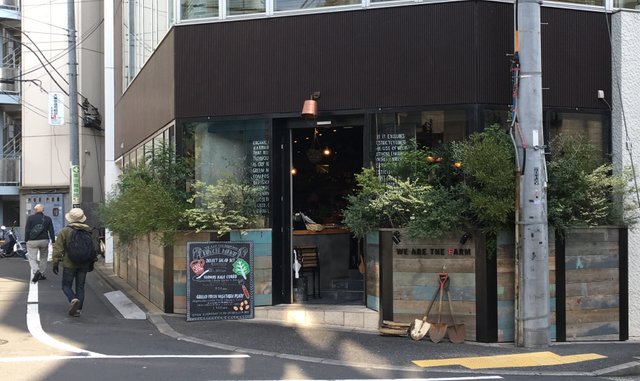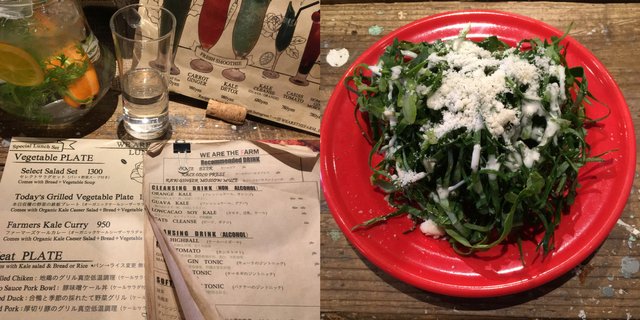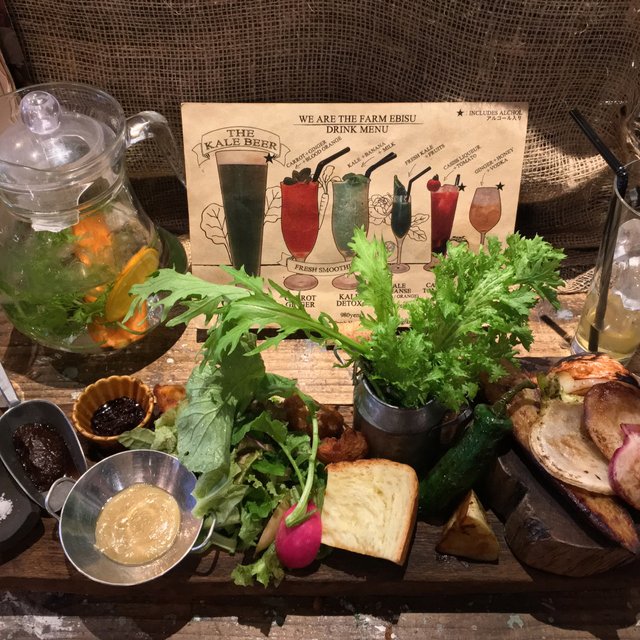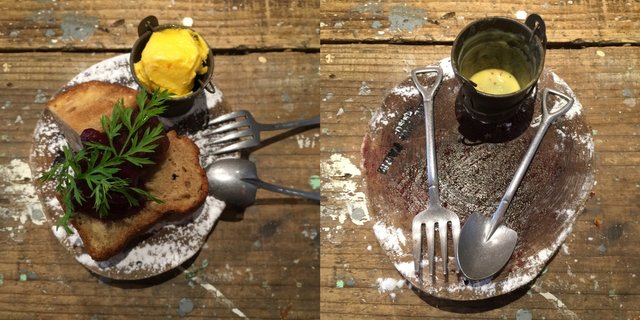Kore Kara Noka これから農家 blog post: From farm to fork in Tokyo: We are The Farm Part 1
The latest article on my blog is the first part of a series of articles looking at the Chiba based farm to table operation We Are The Farm:I start by visiting their flagship Tokyo restaurant, We Are The Farm Ebisu.
We Are The Farm. How could you resist eating at a restaurant with a name like this?! Not only does the name sound great - like a rallying call to lovers of healthy food and cutting-out-the-middleman - but what I read about them seemed to indicate an operation dedicated to bringing good food to the masses, making vegetables fashionable, and advocating a return to good, old-fashioned organic farming. All at the same time. Keen to find out more, and not a little intrigued as to whether this might not be a model worth emulating later on on my path towards becoming an organic farmer, I decided to give both the restaurant and the farm a visit.

Planning my visit to the restaurant I realised that We Are The Farm is not just one restaurant: in fact, this catchy name hides a greater and far more complex structure than is at first to be suspected. The address I had chosen is in fact but one of five - four restaurants and one outlet - all supplied (and run) by a small organic farm in Chiba Prefecture called Zairai Nojo 在来農場. Based specifically around the concept of supplying fresh, healthy and tasty produce directly to the consumer, whilst creating employment for young and enthusiastic men and women passionate about good food and agriculture, the group certainly seems intent on making a name for itself: with one restaurant in the trendy Yoyogi area, a second in Ebisu, a third in Shoto and a fourth in Ginza, it is obviously not shy of spending a penny or two, and seeking attention. And, judging by the photos on their Facebook pages and on various other food-related review sites, the major proportion of their clientele is young, predominately female, fashion-conscious and well-off.
When I turned up for lunch at around 12.30 the restaurant was indeed full of mainly young, female Japanese, all decked out with designer hand-bags and fashionable gear, but I was surprised at how many mothers and gaijin 外人 (foreigners) there were, too. The former, whilst older than the other females there, were still very obviously image-aware and the latter, mainly tall and lanky, seemed to be fashion models. A quite surprising selection of clientele, then, for an organic-farm run business and, to be quite frank, not my favourite kind of people, but a encouraging sign of the kind of success that a prospective vegetable-grower might be allowed to look forward to... As for the staff, the seemed to correspond pretty well to their customers: mainly male, young and stylish, wearing branded sweat-shirts and baseball caps, a far cry from the usual dusty, wrinkled and ancient employees of regular Japanese agricultural outfits.

The menu, typed up in both Japanese and English, presented a small number of meat dishes and vegetable platters. As I was more interested in trying the farm's own products, I chose "Today's Grilled Vegetable Plate," a selection of grilled and raw vegetables from Zairai Nojo, served with various sauces and a big bowl of the restaurant's signature kale Caesar salad. As for drinks, I was quite happy with water, so the waiter filled up my glass from a jug containing more fruit and vegetables than the average Brit sees in a week, let alone in a glass. Impressed, I remarked that I had only ever seen a similar concoction in Nightjar, a world-famous cocktail-bar in London known for their elaborate drinks (even in Paris, cucumber was the most anyone had seemed willing to put in a jug of water), and the waiter explained that the idea was to make the vegetable experience as complete as possible.
When the kale salad came I was a little apprehensive, seeing how much of it there was, and knowing kale to be one of those vegetables that is consumed more for its health-giving properties than for its taste. However, I was pleasantly surprised: a good dose of parmesan cheese atop the Caesar sauce held the strong flavour of the kale in check, not so much taming it into submission as rounding it off nicely and balancing it out. It certainly wasn't a light salad, but I could see how it might be popular with those looking for something healthy to eat but without sacrificing on taste, and not wanting to feel hungry again five minutes later.

When the platter came, I could barely see the wooden plank for all the leaves, roots, dips and sauces that covered it. Whilst not exactly cheap at 1,500 yen, I suspected that I was getting my money's worth: not only organic vegetables are expensive in Japan, but they tend to be quite rich in taste and filling. I tasted the various kabu かぶ radishes and turnips, piman ピマン peppers, jaga-imo じゃが芋 potatoes, tama-negi 玉ねぎ onions, nasu 茄子 aubergines and mizuna 水菜 lettuce leaves and got the confirmation I was looking for: these were proper vegetables, fresh but earthy, the kind you can eat raw (and whole) but want to eat grilled because it brings out the sweetness. As for the sauces, I was pleased to find some miso 味噌 (I am a bit of a miso freak), adding even more nutritious goodness to a plate that was already pretty substantial. I came to the conclusion quite some time ago that when the ingredients are good, it is rarely worth spending too much time and effort on dressing them up: I increasingly like my food (and drink) simple, honest and hearty. This was certainly the case here: in fact, I'm sure many would find the presentation vulgar and the taste unrefined, but I was quite happy.

Because the food was filling I could have left it at that, but I've spent too long working with food and drink to stop at only two dishes, so I asked to see the dessert menu. As I am a fan of ice-cream at the end of a meal, and because I (still) have a sweet-tooth compared to most Japanese, I chose the pumpkin ice-cream with carrot pound-cake, beetroot sauce and carrot leaf. I now knew what to expect taste-wise, but I was a little taken aback by how cute the presentation was this time: raw wood for a plate, a tiny bucket for the ice-cream and a mini garden fork and spade as fork and spoon. Pumpkin (Japanese kabocha 南瓜 pumpkin in particular: the French call it potimarron - "pumpkin-chestnut" because of its taste) is one of my favourite vegetables, so I wasn't disappointed with the ice-cream. However, I'm a fan of autumn vegetables in general, so carrot and beetroot were welcome additions also: the beetroot sauce sweet and rich, the carrot cake heavy and tasty. The Japanese use carrot leaves in cooking (as stuffing, or in soups, in our household) so having some with dessert came as no surprise, indeed their slight bitterness offset the sweetness of the ice-cream and sauce nicely.
Having exchanged a few words with the young lady next to me (she had been making typically cute noises to show she approved of the look of my carrot cake) and the waiter (with regards to the shizenshu that was listed on the drinks menu: he was susprised when I correctly guessed that they were referring to a natural-style kimoto 生酛 sake from Terada Honke 寺田本家, my favourite sake brewery), I paid, received the waiter's personal meishi 名刺 calling-card and left to go home.
Overall impressed by the quality of the food I had enjoyed at the We Are the Farm Ebisu and by the evangelistic enthusiasm of the people working there, I decided to see if I could visit the farm. Having another look at the company website, I saw that there was a recruitment page encouraging anyone interested in farming to get in touch. This was obviously my case, so I sent off an e-mail asking for a tour of the farm. The owner and farm manager, a young (well, about the same age as me, which is REALLY young for a Japanese farmer...) man called Terao Takuya 寺尾卓也, quickly replied and invited me to come along and look around.
To be continued...
We Are The Farm Ebisu
Tokyo-to, Shibuya-ku, Ebisu-nishi 2-8-10
東京都渋谷区恵比寿西 2-8-10 Orix恵比寿西ビル1F
03-5784-3877
https://www.facebook.com/wearethefarm/
We Are The Farm Yoyogi-Uehara
Tokyo-to, Shibuya-ku, Nishi-hara 3-24-10, PD Building 1F
東京都渋谷区西原 3-24-10 代々木上原PDビル1F
03-5738-7744
https://www.facebook.com/wearethefarm/
Stand By Farm Shoto
Tokyo-to, Shibuya-ku, Shoto 1-28-11
東京都渋谷区松濤 1-28-11
03-6416-0724
https://www.facebook.com/stand.by.farm/
Stand By Farm Ginza
Tokyo-to, Chuo-ku, Ginza 3-12-7, Haramachi Building 1F
東京都中央区銀座 3-12-7 原町ビル1F
03-6264-7460
https://www.facebook.com/stand.by.farm/
Kale Farm
Tokyo-to, Toshima-ku, Minami-ikebukuro 1-28-1, Seibu-ikebukuro Honten B1F
東京都中豊島区南池袋 1-28-1 西武池袋本店B1F
03-5949-2020
Zairai Nojo 在来農場
Chiba-ken, Sakura-shi, Sakado 1075-1
千葉県佐倉市坂戸 1075-1
first of all great post, secondly great concept of restaurant for Japan i liked the presentations of the plates a lot, in the last dish i liked the plate and cup as well :P
now judging by this ''all supplied (and run) by a small organic farm in Chiba Prefecture called Zairai Nojo'' and they are suppliers for 4-5 restaurants so you can see your idea has a lot potentials ;) i bet that experience inspired you even more
Hi @filotasriza3 ! Thanks for the feedback! I actually started off tried to write about the entire operation in one post, and then gave up because it was too long! The whole thing was indeed inspiring, but I really can't see myself doing the same thing: running a farm is hard to begin with, so trying to run restaurants and shops on top of that is, I think, well beyond my capabilities!
i dont meant running restaurants but being a supplier for them with your organic makings ;)
just for the sake of knowledge or discussion what are those things that making the running of a farm hard? for example are there any goverment regulations that make it hard or the general soil, others things or many different things together. I know this is a big conversation so i dont want to make you write a lot you can say it in a few words and as an idea it would be a future post that you can explaining the hardships someone can have or the ''goods and the bads'' etc etc :)
Hi again @filotasriza3 ! OK, sorry, wasn't paying attention! One of the brilliant things about Japan - and this is something I will be covering in future articles, both on my blog and on Voluntary Japan for @kafkanarchy84 - is that many things are actually much freer, much more "anarchist" here in Japan than in either the EU or the US. For example, official catalogues of authorised seeds and vegetable varieties, mandatory insurance schemes, and licenses needed to actually sell the food you grow etc. are either virtually or totally non-existent. I guess it's just one of the many "contradictions" that make Japan so unique, but I was very happy when I found out about these freedoms, increasingly absent everywhere else.
wow great!! and these freedoms make you and everyone pay a lot more attention to their products in general their job and passion instead of have to search for all of things and how they work resulting in wasting time or have an anxiety about the ''new rules'' and how to learn everything etc etc. According to this its like Japan says if you love it i make sure at least you give a try without you have too worry too much about the licenses and responsibilities!